#what folks think they're seeing on the surface is often not is what is actually happening
Explore tagged Tumblr posts
Note
how do you have the time to write all this stuff /and/ play video games etc etc at the same time? Is it just that you write insanely fast after all these years? I have a lot of hobbies, writing being one of them, and i have such a hard time juggling them lol.
Hi anon,
So, real talk -> The reality is I don't have the time to write and play video games at the same time most of the time.
I haven't written anything since the 17th. I haven't started the next Palmarosa chapter. I'm on day 8 of not having opened a new document and writing anything.
I've edited a whole two chapters (which I suspect I have to go over again) and I've responded to some comments and asks, and that's it. No writing, no growing wordcount, I've been stagnating / not doing anything due to burnout since the 17th (I know the date because I have a giant whiteboard of completed chapters next to me).
Honestly, most of the time I don't actually have the time to read, play video games, watch television, or movies. I am too busy writing/editing/sleeping. With Toby in the mix, the small amount of media I was consuming has vanished.
Sometimes I can play certain video games while writing - these are usually low stakes video games I can endlessly put on pause and then play for five minutes at a time, like Dorfromantik and Garden Galaxy. Any kind of idler video game, like Havendock is also good for this.
Anon, you can't have a lot of hobbies and actually keep up with them and write the way I do, and therapist/s wouldn't recommend you drop all of your hobbies to write the way I do anyway. Trust me.
I had two things I wanted to start learning this year, and I haven't started learning them yet. I don't have the capacity. I had a therapist gently point out to me that if I was always at 100 in terms of output, how can I have any energy leftover for self-work and processing? The answer is: I don't. (That's actually why I've spent a week playing video games, and if anything it's just reminded me that my capacity is still at 100 and this is going to take a bit of concerted decompression).
Most of the time it's not normally quite this overwhelming. Toby has just maxed me out because he's a high energy dog who is also a puppy with Separation Anxiety, and there's no quick or easy fix for that. But most of the time it's still very intense. The list of shows I really want to watch, and books I really want to read, is very long. But I often don't have time to indulge in those things because I'm too busy writing.
A lot of the time I don't actually have the time to reread my own fics anymore, outside of editing.
This year was meant to kind of tackle that more decisively but you know then we got a puppy so... not so much.
But yeah anon, there is no 'how do you do this and do this' - you don't do one of those things, or you do it very haphazardly, in small amounts.
I do write very fast (my wordcount is 120-150wpm), but I don't edit fast (I'd tender that editing fast for most people is a bit of an oxymoron), I don't answer asks fast (some of the longer ones take me an hour to compose), etc. And even then, writing fast is not the same as the time it takes to think out the chapter, to figure out what's happening, letting it percolate etc. A lot of my life is also just resting. I lose about 2-5 hours of every afternoon to sleep or rest for example, where nothing productive happens. And I think one of the reasons I read so many manwha atm is that they're so easy to read comparatively, and so quick, and that's the only way I can really consume stories these days.
#asks and answers#what folks think they're seeing on the surface is often not is what is actually happening#those who track my wordcount on discord (where i update it)#will notice it's not been updated since the 17th#will i write anymore chapters between here and the end of the month?#i don't know#and if i don't#i will have to work even harder next month dsalkfjasfas#anyway yeah no most of your hard working creatives around you#cannot actually find the life-work balance that allows them to enjoy their lives and leisure time and their hobbies#even if they're writing about characters who are learning how to do those things#part of it is capitalism - it's hard to take a break when your antidepressants went up in price#(which is a broader ironic analogy to life in general)
33 notes
·
View notes
Text
More on pre-electricity lighting.
Interesting to see this one pop up again after nearly two years - courtesy of @dduane, too! :->
*****
After experiencing a couple more storm-related power cuts since my original post, as well as a couple of after-dark garden BBQs, I've come to the conclusion that C.J. Cherryh puts far too much emphasis on "how dark things were pre-electric light".
For one thing eyes adjust, dilating in dim light to gather whatever illumination is available. Okay, if there's none, there's none - but if there's some, human eyes can make use of it, some better or just faster than others. They're the ones with "good night vision".
Think, for instance, of how little you can see of your unlit bedroom just after you've turned off the lights, and how much more of it you can see if you wake up a couple of hours later.
There's also that business of feeling your way around, risking breaking your neck etc. People get used to their surroundings and, after a while, can feel their way around a familiar location even in total darkness with a fair amount of confidence.
Problems arise when Things Aren't Where They Should Be (or when New Things Arrive) and is when most trips, stumbles, hacked shins and stubbed toes happen, but usually - Lego bricks and upturned UK plugs aside - non-light domestic navigation is incident-free.
*****
Here are a couple of pics from one of those BBQs: one candle and a firepit early on, then the candle, firepit and an oil lamp much later, all much more obvious than DD's iPad screen.


Though I remain surprised at how well my phonecam was handling this low light, my own unassisted eyes were doing far better. For instance, that area between the table and the firepit wasn't such an impenetrable pool of darkness as it appears in the photo.
I see (hah!) no reason why those same Accustomed Eyes would have any more difficulty with candles or oil lamps as interior lighting, even without the mirrors or reflectors in my previous post.
With those, and with white interior walls, things would be even brighter. There's a reason why so many reconstructed period buildings in Folk Museums etc. are (authentically) whitewashed not just outside but inside as well. It was cheap, had disinfectant qualities, and was a reflective surface. Win, win and win.
*****
All right, there were no switches to turn on a light. But there was no need for what C.J. describes as stumbling about to reach the fire, because there were tinderboxes and, for many centuries before them, flint and steel. Since "firesteels" have been heraldic charges since the 1100s, the actual tool must have been in use for even longer.
Tinderboxes were fire-starter sets with flint, steel and "tinder" all packed into (surprise!) a box. The tinder was easily lit ignition material, often "charcloth", fabric baked in an airtight jar or tin which would now start to glow just from a spark.
They're mentioned in both "The Hobbit" and "The Lord of the Rings". Oddly enough, "Hobbit" mentions matches in a couple of places, but I suspect that's a carry-over from when it was just a children's story, not part of the main Legendarium.
Tinderboxes could be simple, just a basic flint-and-steel kit with some tinder for the sparks to fall on...


...or elaborate like this one, with a fancy striker, charcloth, kindling material and even wooden "spills" (long splinters) to transfer flame to a candle or the kindling...

This tinderbox even doubles as a candlestick, complete with a snuffer which would have been inside along with everything else.
Here's a close-up of the striker box with its inner and outer lids open:

What looks like a short pencil with an eraser is actually the striker. A bit of tinder or charcloth would have been pulled through that small hole in the outer lid, which was then closed.
There was a rough steel surface on the lid, and the striker was scraped along it, like so:

This was done for a TV show or film, so the tinder was probably made more flammable with, possibly, lighter fuel. That would be thoroughly appropriate, since a Zippo or similar lighter works on exactly the same principle.
A real-life version of any tinderbox would usually just produce glowing embers needing blown on to make a flame, which is shown sometimes in movies - especially as a will-it-light-or-won't-it? tension build - but is usually a bit slow and non-visual for screen work.
*****
There were even flintlock tinderboxes which worked with the same mechanism as those on firearms. Here's a pocket version:

Here are a couple of bedside versions, once again complete with a candlestick:



And here are three (for home defence?) with a spotlight candle lantern on one side and a double-trigger pistol on the other.

Pull one trigger to light the candle, pull the other trigger to fire the gun.


What could possibly go wrong? :-P
*****
Those pistol lanterns, magnified by lenses, weren't just to let their owner see what they were shooting at: they would also have dazzled whatever miscreant was sneaking around in the dark, irises dilated to make best use of available glimmer.
Swordsmen both good and bad knew this trick too, and various fight manuals taught how to manage a thumb-shuttered lamp encountered suddenly in a dark alley.
There's a sword-and-lantern combat in the 1973 "Three Musketeers" between Michael York (D'Artagnan) and Christopher Lee (Rochefort), which was a great idea.
Unfortunately it failed in execution because the "Hollywood Darkness" which let viewers see the action, wasn't dark enough to emphasise the hazards / advantages of snapping the lamps open and shut.
This TV screencap (can't get a better one, the DVD won't run in a computer drive) shows what I mean.

In fact, like the photos of the BBQ, this image - and entire fight - looks even brighter through "real eyes" than with the phonecam. Just as there can be too much dark in a night scene, there can also be too much light.
*****
One last thing I found when assembling pics for the post were Folding Candle-lanterns.
They were used from about the mid-1700s to the later 20th century (Swiss Army ca. 1978) as travel accessories and emergency equipment, and IMO - I've Made A Note - they'd fit right into a fantasy world whose tech level was able to make them.

The first and last are reproductions: this one is real, from about 1830.
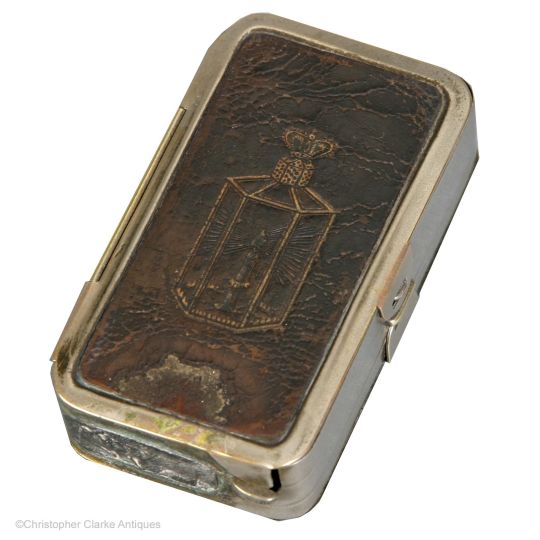
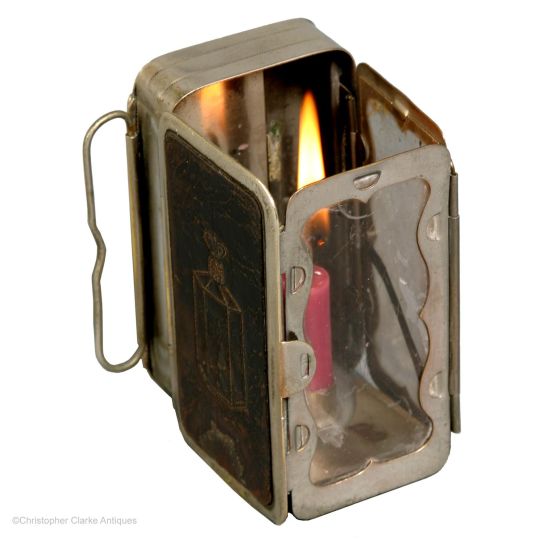

The clear part was mica - a transparent mineral which can be split into thin flexible sheets - while others use horn / parchment, though both of these are translucent rather than transparent. Regardless, all were far less likely to break than glass.
One or two inner surfaces were usually tin, giving the lantern its own built-in reflector, and tech-level-wise, tin as a shiny or decorative finish has been used since Roman times.




I'm pretty sure that top-of-the-line models could also have been finished with their own matching, maybe even built-in, tinderboxes.
And if real ones didn't, fictional ones certainly could. :->
*****
Yet more period lighting stuff here, including flintlock alarm clocks (!)
#period lighting#tinderbox#too light too dark#social history#writer notes#research#period tech#sword vs lantern#c. j. cherryh
2K notes
·
View notes
Note
Some of this might sound intentionally hostile in text and I apologize.
I'm saying this as an abuse survivor mind you - don't throw "abusive ships" under the bus so easily - at least, so long as they're not actually glamorizing the abuse. I lived that irl and I personally find someone overcoming it, slowly having enough of that bullshit and getting out over time, and the other person having to wipe their own butt for once after they've made the damn mess, very refreshing. Maybe that's not a ship in the traditional sense. It's no happily ever after bc it shouldn't be, but I find stories like mine shyed away from so often because even the portrayal gets considered a "canon ship". ... that's just how media works now, I guess? I very rarely See a fictional relationship not called a ship in literally any context now so that's the definition I'm running on.
I wish more people were willing to portray the hardships of finding acceptance outside of "whoever you can find will accept you" very much, and finding the better things after. I wish people weren't terrified out of portrayimg situations like mine.
Jessie.. is not a good person in canon. You expect me to believe she moved into to hanamusa seamlessly, without falling on her ass? I never see you talk about Jessie's abusive tendencies in canon. You never talk about the inherent meanness she needed to get over to get there. She's quite aml lot like my ex in canon, actually.
What do you mean you're going to just remove from the character that she is abusive to those around her. Jessie hits people. She takes her own junk out on others all the time. Do you even like the character then, are you actually invested in her growing, or are you just making an OC at this point?
Idk. Do you, boo. But you are posting about a character who, whether you like it or not, is canonically abusive. I just don't buy that dating Ash's mom alone fixed her. That isn't... How that works. It would be excellent if it did. Part of my love of hanamusa is that it signals Jessie's change - but she could have changed for anyone before now.
What makes Delia different? How is she specifically a turning point for Jessie? Because Jessie's flaws go well beyond just bossing people around.
I would love if my abuser had the same outcome as your Jessie. I adore your portayals of hanamusa, where she's still flawed but still strives to do better. That's all I ever wanted from my ex.
What the fuck got her there tho.
Anyways I've been watching a lot of Bojack Horseman lately -
I agree with you! I don't think abusive relationships (or any tough subject matter in general) should be shied away from in media. It can be powerful when executed well and written by folks who are equipped to tell those kinds of stories. I do think it's sad when people treat it as off limits. But the ask I got was definitely more about which ships I have where I actually like the relationship between the characters. I think the semantics of the word "ship" are kind of vague or rather, over time, got so specific to only mean "absolutely love together and want them as endgame" (for most people anyways). So that's usually what I take the word to mean when people ask me about it.
I can 100% appreciate how an abusive relationship is written and handled, but that doesn't mean I'm gonna ship an abuser with their victim (that falls into the glorifying you're talking about). Love Bojack Horseman! Big fan! I think the way they handled Bojack and Sarah Lynn was beautifully and tragically well written. But does that mean I ship Bojack and Sarah Lynn? Absolutely fucking not.
I've talked about Jessie's character plenty on this blog and the way she's handled in earlier seasons specifically. This is kind of a summary: If we look at it on surface level, yes we can say she was abusive. But I think it's important to acknowledge and take into account the medium, time period and culture. Slapstick and cartoon violence was HUGE in anime and animation in the 90s (and prior to that too). Characters were always cartoonishly slapping each other around with giant mallets, folding fans, etc. Looney Tunes style. These slapstick bits were always distinct from real abuse and hurt (for Pokémon, Jessiebelle comes to mind). Mean slapstick wasn't a character trait exclusive to Jessie either. We saw it in Misty, James, Meowth, characters of the day and pretty much any character who got mad. It was a visual shortcut to show anger.
This type of slapstick has since (thankfully) died out and it hasn't really been a part of the Pokémon franchise since the early 2000s. However, Jessie was a notably special case. One of my favorite fun facts about the Pokémon anime is that there was a point in the series where Megumi Hayashibara (Jessie/Musashi's seiyuu) told the writers that moving forward, she no longer wanted Jessie to be violent or to be shown hitting James or Meowth (source: her memoir "The Characters Taught Me Everything"). She thought it directly went against the vision Takeshi Shudo had for Jessie, James and Meowth, when he created them, which was that they are good natured villains. If you watch from DP and on, Jessie never lays a hand on either of them. I think it was a such a good move on Pokémon's part to change her character like that and I'm forever grateful that Hayashibara said something! Whenever I write Jessie now, I always keep that in mind. She's mean, shouty and stupid but would never genuinely hurt those she cares about.
From then, her character becomes much more bearable. She's still bossy, mean and vain (typical cartoon villainess attributes) but I'd hesitate to say abusive. She'll still yell at James and Meowth, they all yell at each other, but in more of a sibling way (imo) rather than a "i'm actively trying to hurt your feelings way". The show makes a point especially in later seasons to show that Jessie, James and Meowth are not beyond being redeemed. From conception the whole POINT of the Team Rocket trio was that they are redeemable but their persistence and obsession keeps getting in the way of them seeing that there's a better life for them out there.
I won't deny that Jessie was unsavory in earlier seasons, but when I write her, I choose to write the version that Takeshi Shudo and Megumi Hayashibara had envisioned from the get go. She's still incredibly flawed and makes plenty missteps but wants to be better as you stated! My favorite part about Jessie is that she's a piece of shit LOL and I enjoy writing the changes she goes through to be better (but then still showing her default so some of her evil tendencies). In this AU, Delia doesn't fix Jessie. Jessie fixes Jessie because she is with someone makes her want to be a better person. She's already in the middle of turning over a new leaf before even meeting Delia, after leaving Team Rocket. Writing Jessie as legitimately abusive I think could work, but that's not my story to tell and if someone who were more equipped to tell that story did, I'd be very interested to take a listen!
I hope this doesn't come off as trying to deny or invalidate your experience. If you see that in Jessie, I hear you! This is just how I've interpreted her character over the years, having watched every episode of Pokémon and reading Japanese interviews from the cast and crew. She's such a compelling character and I love how messy she is
480 notes
·
View notes
Text
Okay so I see some people are debating what the monster from Still Wakes the Deep is. I'm inspired by the support from my Death Angel post, so I'm gonna try giving an analysis. Now science is not my strong suit, I'm much better at zoology, but here we go.
Of course, spoilers ahead!
So, the entity comes to light in act one. While Caz is being yelled at by his power drunk boss, Rennick, a worker going by the name Gibbo calls up to say there's an issue with the drill, something highlighted earlier by another worker. Rennick orders the drilling anyway, and thus begins the nightmare, as the drill seems to unearth and awaken a destructive parasite out for revenge. But I don't think that's as deep as it goes, pun intended.
Let's say, the creature is a parasite. A form of near sentient bacteria, though take that description with a grain of salt, I'm no scientist. Parasites simply cannot live on their own. That's an objective fact. They need a host. They exist within another for survival and breeding purposes, and multiply and spread through the body of another.
Parasites, bacteria and even fungi can live underground for years, and have been discovered to do so. Ancient lifeforms have been discovered just under the surface of earth, let alone deep underneath the ground and in the bottom of our oceans, one of the most complex and diverse biomes that our current science has barely scratched the surface of. It's highly likely this creature is a self replicating bacteria or parasite that was unearthed by the drill, and took up new hosts to survive in this change of environment.
But not every host worked. You can see half transformed, mutilated bodies everywhere, and some that haven't even changed at all. These bodies could not support the parasite and shortly died.
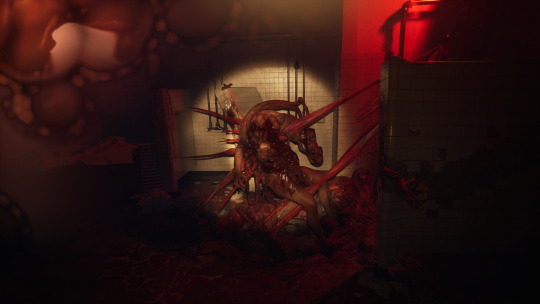
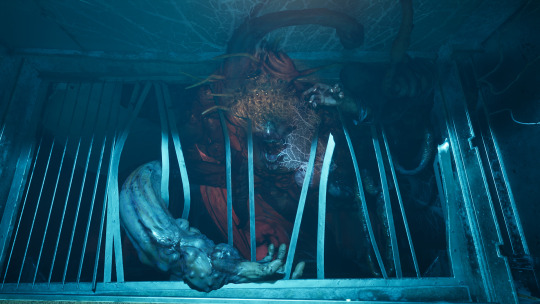
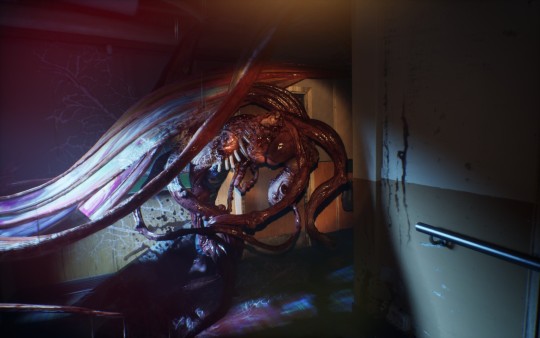
However, a few select hosts DID end up surviving; Gibbo, Muir, Rennick, Addair and Trots. It's unclear what sets these people apart from the others, and I don't know enough about this topic to claim an answer. But I certainly do think these folks died soon into the transformation, and are not fully conscious in the body. They frequently repeat terms and phrases, and never say anything you might expect from an entity possessing them, implying it's borrowing words and sentences that have been said by the host before, in other circumstances.
The entity plays with Caz's memories and definitely the others' too, though not all of them good. It wouldn't be a surprise to realise that's where it's getting information about it's host, as it reads the memories inside the brain to learn faces, names, and even the host's personality. Which makes me wonder, does it even realise what it looks like? Does the creature itself actually realise it's a parasite? Or does it completely and fully believe it is the person it's connected itself to? It almost downloads their personality and tries to pretend like everything is completely normal.

Let's talk about arguably the best monster (in my opinion), Muir. Muir moves about the area he frequently worked as what I assume was an engineer. He roams the familiar ground, almost unsure of why he's by himself. He often calls out to his coworkers, wondering out loud why they're treating him like he's different. Sure, this could be the real Muir's consciousness slipping in and out of the seams, but it's highly unlikely he would still be alive. Much like the zombie fungus, as it's often called, the host is not alive when the fungus is controlling it, and is merely a puppet. If the spiders it was corrupting could talk, I daresay, they'd be acting like them. Taking their place in the world, even if they don't realise it.
But every animal needs to eat. And eventually, that body is going to run out of tasty, tasty neurons. Like I said earlier, a parasite needs to spread. It'll breed, then spread to another to keep it's species alive. By infiltrating a 'pack' of animals, it will take anything to spread to the others. Which is exactly what the parasite does whenever it sees another human. Either that, or it will consume them, theoretically to feed the host so it stays alive, while keeping those tasty, tasty neurons for itself. You can almost see this process with Innes, as the elevator ascends without him, and you just faintly see Muir doing something in the distance. Likely consuming him for nutrients, as he was not connected to the parasite yet.
Next, there's Addair.
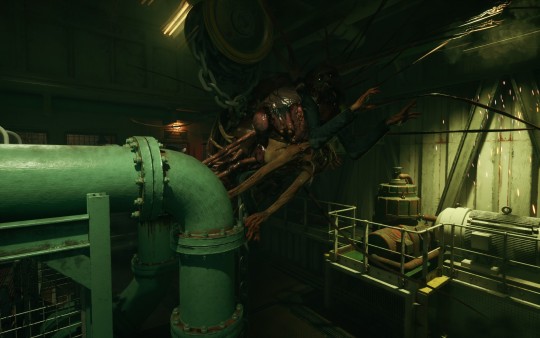
Addair, much like Muir, patrols familiar ground. Even though Addair himself wasn't even in that area when the drill struck. Now Muir was actively in that familiar space in the beginning, and it's safe to assume that's his place of transformation. But Addair was eating in the cafeteria when the incident happened, not deep down in the engine. Did he go down when the impact happened, while Caz was unconscious? Maybe. But the lights were fine then, and the engine wasn't the problem, so he didn't need a reason to. Plus, he doesn't seem like the type to be work dedicated, more inconvenience dedicated. Considering what I said about the parasite (badly) taking their place in society, did it go to his place of work after detecting that as his 'natural environment', per se?
Plus, unlike Muir, who greets the situation with quotes of confusion, fear and anxiety, Addair is instantly aggressive. Even an asshole like Addair is likely to panic if conscious in this situation, so the nervousness was Gibbo and Muir exclusive. But Addair and Rennick become immediately angry upon seeing Caz, as they actively disliked him in life, and so the parasite processes him as a foe to it's host. I thought that was neat.
Now another take I have admittedly heard from several other people, but I thought was worth mentioning. The monsters are incredibly similar to sea creatures. Which means this underwater bacteria was possibly leaking out already, and transforming our animals, not enough to completely corrupt them, but enough to twist their bodies. Think of the appearances of deep, deep sea creatures, such as the anglerfish. Isn't it possible this parasite was responsible for their uncanny appearance, in this universe? Muir especially looks like a spider crab, or perhaps even a bigfin squid.

Which again, is a deep sea creature. Rennick also reminds me of a blobfish once removed from the pressure of the deep sea. Addair seems very jellyfish-like, but may be something else very... tick-like. And even Trots gives me major merfolk vibes, with how untouched his torso is in comparison to his lower half.
This parasite could have been feeding off the neurons and breeding through our very ecosystem as the ground slowly gave away above it. The drill unearthing the source likely gave it a burst of control as so much energy was released at once, hence why it was so fast to literally spiral out of control.
But Scotland, by all means, is not the only place in the world connected to the ocean. Sure, they destroyed this batch, but other forms of this parasite live on elsewhere on earth. And the explosion may not have even destroyed it. It definitely would've destroyed the host bodies, yes, but certain bacterias can survive impressive damage, even heat hot enough to burn off human flesh. We'd best hope this is not one of those bacterias.
I didn't really get as far with this observation as I did with other horror studies, but I had fun nonetheless! Like I said, I'm really better with zoology (hence the sudden enthusiasm when I started on sea creatures), but I loved Still Wakes the Deep SO much that I just wanted to write down my thoughts. If you have any other theories, feel free to add them!
Also if I used your pictures/gifs and you would like me to add credit, I am so so sorry, I will absolutely add that as soon as you say so, I just got most of these off Google and couldn't find most the original sources. So yeah if you'd like me to add your name and mention, or you want me to remove it in general, feel free to just say and I'll add it, I don't bite I promise. Well... I won't bite YOU.
Sorry sorry, had to make a zombie reference--
#ahhh I was supposed to try sleeping 4 hours ago#insomnia crossed with ADHD is one fun mix#anyway still wakes the deep is an absolutely incredible experience that I highly recommend#here come the tags#still wakes the deep#swtd#muir#addair#gibbo#cameron mcleary#is that how you spell it?#caz mcleary#rennick#trots#long post#game analysis#tw body horror#tw spiders#kinda#muir looks spider-y#tw thalassophobia#for the squid#bigfin squid#zoology#tw gif warning#still wakes the deep spoilers#tw gore
234 notes
·
View notes
Text
The Merry Widow (1968) with Jeremy Brett
I've not been a lot on social media lately because of the complete takeover from US'ers (which - understandable, I'm worried and grieved too, but still there are other countries and issues and the way people often neglect to specify they're talking about the US and assume all their readers are in the US too is kind of obnoxious) so I've directed my very limited time and energy towards something which has given me a lot of joy in recent years and is often freely accessable too: old media. I'm making a valliant effort to actually finish Moby Dick and Les miserables and Raffles, I've read the first collection of Arsène Lupin, I'm trying to get into Hercule Poirot (not entirely convinced yet but we'll see), and last weekend I watched The Merry Window movie of 1968, starring Jeremy Brett. It is entirely on youtube here. Not in the best visual or auditory quality, sadly (it has not been remastered yet), but still very watchable.
I went into this without any knowledge of the story or rich history of this operette, only having heard a few fragments of the songs before. And I was so, so entertained throughout, even though I did not understand everything that was going on.
A summary of my prompt research: The Merry Window (Die Lustige Witwe) was composed by Austrian-Hungarian composer Franz Lehár and first performed on stage in 1905 in Wien, running a very succesful row of almost 500 live performances. It has since been adapted both on screen and stage often, even through this very day. The Metropolitian Opera has a comprehensive synopsis on the story on their website, but more fun is this comic.
The basic story goes as follows: the embassy of a small Balkan country (fictional, but likely to be inspired by Montenegro), situated in Paris, is thrown into merry chaos as they learn that a very rich widow originally from the same Balkan country also is residing in Paris. Shenagans and plotting occur to try and convince her to marry one of their countryman, so her sweet sweet money won't leave the country, which is in dire need of it. There's only a problem: the proposed candidate, a count played by Jeremy Brett, already knows the widow, and the two of them have a History. Avoidant behaviour, sassiness, misunderstandings and other delicious drama ensue.
I did not expect the amount of music and songs in this movie. I think 80% or 90% of the script is in song rather than dialogue. Entire performances are shown, during which the plot just stands still, and honestly? I loved it. Modern movies/shows often move too fast for my sluggish autistic brain to keep up with, and this languid tempo just worked well for me. The folk and, I imagine, quite scandalous can-can dances are a joy. I'm usually not that fond of the more classical technique of singing but I found the music here quite gorgeous, too, a delightful mix of classical sound with fun folk elements. Jeremy Brett's rich voice really stood out of me. You can listen to the entire soundtrack here.
Jeremy Brett is a treat to watch in his role as a bit of a playboy, avoiding responsiblities and commitment and feelings of heartbreak by dancing and drinking at a local nightclub each night instead. Not suprisingly for everyone who has seen him in Granada's Sherlock Holmes: he's really excellent at dramatic posing, lounging on surfaces not meant for that, and 'trying to look cool but actually besotted'. There's a lot of humour in the dialogue and performances of the entire cast, too. For example, there's an entire extramarital affair going on right under the nose of an antirely oblivious baron's nose, and it's pretty hilarious. Further example of some funny lines: "What have you been doing lately?" Absolutely nothing!" "Excellent!" Jeremy's rivalry with the widow (played by Mary Costa) is especially a lot of fun, both really sell that part. I really got quite emotional by the final "Love unspoken, faith unbroken..."
There's an interesting background of historical social context to this operette, too: widows in that time enjoyed an amount of financial freedom denied to either unmarried or married women, and watching high class men competing for a woman's money was, I suppose, a nice bit of social commentary. I also really enjoyed a song by a group of men all wondering what they have to offer women if it isn't money - a question, in my opinion, that may be asked more often. The widow using her relative freedom to protect another woman from scandal at the end was rather sweet, too. The story ends, of course, by not upsetting the status quo too much. But it's such a fun ride.
All in all, very much recommended.
34 notes
·
View notes
Note
I read that josh body language post. It’s like they’re living in a completely different universe! I mean, seriously, these are the same people who tried to redefine “skittered” and somehow thought it would be a great idea to dive into fly fishing. Because, you know, nothing screams “literary genius” quite like a detailed breakdown of a fishing term and thinking that's exactly what Sarah had in mind. 🙄
Like, do they think Sarah wrote skittered hoping her most dedicated fly fishing fanatics would understand. 😂 Because I can’t imagine a single person outside that niche who cares about how a word used for darting fish could possibly relate to body language IN a romance book.
This is what their post said:
Skitter (v) - to draw (bait) jerkily across the surface of the water as a technique in fishing
The fact that Azriel's shadows skittered back could imply that they actually wanted Elain; that they were trying to draw her in, for whatever reason.
You know, having opposite intent of recoiling.
Honestly, it’s impressive how they manage to spin these absurd narratives. Incorporating fishing lingo into their analysis of character relationships. “Oh, his shadows totally skittered away, just like a trout escaping a hook!". 😂😂😂😂
These folks are really grasping at straws, and it’s hilariously cringeworthy. Keep it coming, though—this level of delusion is pure entertainment!
If you ever watch any of Sarah's interviews where Josh is present you see he's a bit of a fidgety guy. Also both Sarah and Josh become evasive when they're tip-toeing around questions that they know Bloomsbury might want them to answer in a certain way so as not to give anything away. I would bet money on the fact that he has absolutely zero emotions towards the possibility of Gwyn and Az together, that he is 100% supportive of what Sarah chooses to do with her characters. It's wild that they'll believe reading the body language of Josh is somehow a major clue while completely ignoring Sarah's friend directly saying "I don't think E/riel is happening." That they'll ignore Sarah laughing at the theory they had of Gwyn being a child but Josh somehow has skin in the game over who Az ends up with.
To your point about skittering. My guess is that a seasoned author is going for the obvious definition of skittering in her writing and not the answer that only those with fly-fishing terminology awareness have. Not to mention Sarah made sure we understand the point Az was making when he followed it up with "they'd always been prone to vanish when she was around." How can anyone claim that in one breath he's suggesting they're trying to lure her in when the next sentence literally tells us they often disappear around her. You know, that's the same issue I have when they try to claim Elain's scent of Jasmine and Honey has anything to do with night blooming Jasmine. First off, Jasmine is first mentioned in the Spring Court (book 1). But also, Sarah followed up "jasmine" and "honey" with "like a promise of SPRING." Is that not the author nudging you in the direction of her meaning? Especially when later we have Nesta thinking how the SPRING COURT had been MADE for someone like Elain? I guess they'll keep seeing what the want to see but I don't think they're going to like what the end result looks like.
21 notes
·
View notes
Note
HIHI!!! I hope you're good, Puff!!
If you're ever up for it, I'd love to hear how you work and create while dealing with ADHD. I got a confirmed diagnosis just yesterday (though I've been suspecting it for a long time) and it'd be wonderful to hear how you cope with the struggles it provides, or even discuss any benefits you've discovered.
If not, no worries!! Thank you for reading this, Puff!!
<3
oh god I feel so bad every time this question comes up because. I can't really tell you how exactly I've been able to do it LOL Congrats on getting your assessment, I actually just got paired with a new physician the other day and am now pursuing medication for my own ADHD struggles as well! I got diagnosed with 100% combined ADHD yaaaaay!
Short answer to your question: very very carefully! Because despite the work I put out, I am still VERY prone to burnout. While on the surface you all see me putting out regular updates of Rekindled, underneath that are projects that have fallen to the wayside because my brain just said "nah, I don't wanna play with you anymore" and that sucks! And I don't want Rekindled to wind up that way either!
Recognizing my limitations and making accommodations where needed has definitely helped. Changing my update schedule from once a week to once every two weeks, working with an assistant, learning which battles to fight and which ones to pass on, etc. Obviously out-of-pocket things like having an assistant aren't options for everyone, but getting to work with Banshriek has really opened my eyes to how much I was putting myself through with when I was flying solo. I have that bad habit of taking on way too much for myself, thinking that I'm capable of being everything within a project and fulfilling every role, but that's exactly how folks like us wind up getting burnt out and falling out of love with our projects. So I've definitely learned to appreciate collaboration more in that regard, both for the sake of "carrying the load" as well as giving me another voice to give input and feedback.
But when that's not an option, definitely make sure to pace yourself. There's so much misinformation about what makes a "successful" comic and normalization of extremely unhealthy working habits that it makes people think they're not allowed to make comics unless it's a 50+ panel a week ordeal. Update on a schedule that works for you, people appreciate consistency above all things, even if it's only a page a week or a few pages a month, that's more than enough.
You also absolutely need to make sure to rest. Proper rest, no thinking about the next page or the next update, just go out and exercise or hang out with friends or do something that gets you away from your usual working area and also provides you with stimulation. It's good for both your mental and physical health. I know with ADHD it can be very tempting to just pour every bit of yourself into a project right off the bat because you're so excited and full of BEANS, but that's just the dopamine demon talking! Don't let it tempt you into spending all of it in once place! If you do that, that's when you'll wind up burnt out and taking breaks that you can't recover from! It's a marathon, not a race!
When it comes to my own experiences, I really just love drawing comics. If it wasn't Rekindled, it would be anything else. That made it 'easy' to turn it into a habitual routine, but that's only because to me, drawing comics is the escape from the more boring shit I have going on in my life. This means I have to balance it carefully so that it doesn't become too much of a job or an obligation. There are definitely times when that balance tips, when the last thing I wanna look at is whatever episode I'm working on, and when I find myself crunching on pages with 2 days left on the clock before an upload.
The important thing is not to get yourself down over the failures and keep moving forward, even if it's not as fast a speed as you were hoping for. We're often really hard on ourselves to put out 150% on everything we do, but if 150% were the norm, it would just be 100%, y'know what I mean? And even still we're not designed to put 100% in every day, because some days we'll only have the capacity to offer up 30% - 30% is 100% on those days. Be kind to yourself <3
37 notes
·
View notes
Text
I don't think about it too often because I'm usually busy thinking about the lost potential of Swan Queen but holy shit the lost potential that is Outlaw Queen gets to me too.
Like here you have this folk hero who is basically the symbol of class struggle and selfless bravery, and we never get to see any of that? When we first meet Robin Hood, his goal is a selfish (albeit understandable) one. He wants to save his wife and unborn child.
We don't actually get to see him do the take from the rich, give to the poor thing he's so infamous for until seaaon 4. And even then, his main focus is once again on Marian. He's not helping her for purely selfless reasons; he wants a relationship with her.
Now imagine if we'd gotten the hero version of Robin Hood, the guy who hates mindless cruelty and stands against inequality. He really does steal from the rich to give to the poor. He turned his back on his own title and nobility to go live in the woods with a group of people who have nothing but the clothes on their back and a better vision for the world. He's the thorn in the side of every royal in the realm. Maybe he was even personal friends with Snow White at one point (seriously they have very similar backgrounds and a strong connection to Regina, why do they never interact?).
And then he meets Regina and she comes from basically the exact inverse of his own situation. Her mother had nothing but with cunning wit and determination she managed to claw herself into a position of nobility. She hurt and stepped on a lot of people on her way up but didn't care. All that mattered was increasing her social position.
Regina for her part, doesn't care about money or status. She fell in love with a stable boy and was willing to throw away everything her mother had won for a quiet life with just enough to get by and be happy.
But then things changed. Her love was murdered and she was forced into a marriage with a king. In her spiral into darkness, she clung to the title of queen for some semblance of power and agency.
She grew accustomed to indulging her every whim. She razed villages to the ground. She sneered at anyone who was "beneath" her.
Even after her supposed redemption, she still looks down on those with less than her. She meets Robin and the insults fly freely from her mouth. He's a smelly forest dwelling peasant. It's hate at first sight.
She's responsible for hurting people he's loved, for killing his wife, and yet they're soul mates. What an interesting dynamic that would be to explore and yet they barely scratch the surface.
All we get is some light teasing back and forth and then he handwaves away her entire past because she's changed or whatever and I guess they're in love now.
#regina mills#regina mills headcanon#outlaw queen#he's only robin hood aestheticly and it bothers me soooo much#there was so much to dig into there and yet again they just didnt
80 notes
·
View notes
Note
Yesss another ask game!! Can we get number 4 for Arvo & Folke? :D
OHH. DIS ONE IS FUN
4. How would they describe each other if asked? Physically? In personality?
folke describing arvo, physically:
"... Short. But, uh, part of that might just be... relative to me. Hehe... He is actually rather... normal-looking, for the most part - he, uh, could blend in a crowd well... if he chose to. That latter part, um, interests me... for when I first met him, I had been struck by something, actually - first off, his... his demeanour was so... unlike anyone else. Very bold... unconcerned with things. Secondly, uh... his gaze is incredibly... striking. I'm not sure how, exactly, to describe it - you feel very exposed when he is looking at you. Like... he's looking past all that is on the surface, almost as if he doesn't... register it at all."
arvo describing folke, physically:
"Odd. The initial impression could be likened to a frightened deer - fragile. As if you could tip him over and he would shatter. That instability plagues his mannerisms, as well. He constantly seeks some sort of anchor with his hands. His hands... they're always grabbing at something. Usually himself, as if he's trying to ensure that nothing does shatter him."
folke describing arvo, personality:
"I... hmm. I think most, uh, would consider him rather rude and... and inconsiderate. And, perhaps... to be honest, that is true in a way... but I also feel that... uh. It comes from a sort of... honesty? Arvo does not hide what he thinks, even if it is something that I would disagree with. Or... or find rather odd. He is straightforward, in that sense, and... I don't get the feeling that it is malicious, necessarily... part of it has to do with his... his curiosity, too. He, hah - that is one thing that he does try to hide, but he's... not especially adept at that...! But, uh, as a result of that... he often asks things which... other people may see as... uncouth. But there... there is an earnestness there, buried... which I can appreciate.
He's also... rather funny. Although half of the time, I can't tell if, uh... if it's intentional..."
arvo describing folke, personality:
"... Intelligent. Naive, but intelligent. Emotional. He can very clearly reason, and is intrigued by discussion - but he lets his emotions cloud what could possibly be good judgement, if he were to experience more of the world... I have the feeling that he's rather sheltered. He's also stubborn. Truly so. To the point that it is somewhat entertaining. One may be able to tip him over, but after tumbling down the hill, he will lay on his back and still explain to you how you did not, in fact, tip him over. In that silken, careful tone of his.
Entertaining, as I said."
#asks#oc stuff#pareidolia tag#oc: folke#oc: arvo#U guys know. U guys know i love writing guys talking. hehehehehe#in case its not clear btw this is from the pov of folke and arvo during pt 1. so#before folke knows arvo is a basilisk yadda yadda
18 notes
·
View notes
Text
Fantasy Castle Thoughts
Wandering around castle ruins on the weekend while thinking about my fantasy WIP had me thinking about more worldbuilding stuff in fantasy (the obvious ones being covered by others, such as, where does the shit go? How do they get water? How do they not poison themselves while answering Qu 1?):
That film where they erased the entire town and the castle was sat there for no reason (meant to be Rochester) - look, even if your castle is a strategic fortress in the back of beyond, it will have some kind of nearby settlement. Because: who is building it and how long does it take and where do they all live while they're constructing it? Where do they go afterwards? How do the garrison get food (easier to grow crops and raise livestock nearby than have vulnerable wagons bringing it in and being ambushed).
A lot of castles were not built by locals, because you can't trust the fucking locals, that's (usually) why the castle is THERE. If you don't need a defensive structure you build a manor or a stately home. If you're building a castle, it's usually to subdue the population or to defend against the neighbours, but either way, what often happens is that the king or whoever will round up people from his patrimony he knows he's already whipped into shape and can trust, then force-marches them across country and re-settles them in the area the castle is meant to be. They are the ones who then farm and raise livestock, and push out the locals to do so. Over time, you get some intermingling and after a few gens it's a very different demographic, but you have a story of settlement going on with tensions bubbling under the surface. See also: William Rufus wanting to subdue the North of England, forcibly uprooting his tenants in the South of England and making them build and settle in Carlisle, where he built his castle (11thC); the Earl of Lincoln dragging a load of Yorkshire and Lancashire and Lincolnshire men to re-settle his newly bestowed North Welsh lordships, pushing the Welsh into the uplands while the settlers took over the lowlands (12th-13thC).
The settlers around castles bring their own forms of folk religion, superstition, folklore, dialect, and naming patterns, which are specific to their original region. These may be very similar to the ones where they've been settled. What does that look like? Is the culture of particular villages and settlements a little bit different or maybe strikingly so the closer you get to the castles in your world because of this? What are the issues faced by settlers and by local people, how do they get resolved (or do they)? You'd imagine settlers are favoured in court disputes, but depending on the politics, they may actually be overlooked in efforts to appease the locals, leading to some lords really upsetting the very people they took for granted that they could trust. What's going on with all this local level stuff? By the way:: 21stC "my religion is better than yours" is so fucking boring and overdone imo from Western fantasy. Not every fantasy people has to have a US Evangelical approach to faith. Maybe they just don't care, or as soon as they hear something new they're like oooh this is interesting let's incorporate that! And they do. And it's fine. And that's a normal attitude to have. That might be a lot more fun, because then you get multiple variations on a theme, which create lots of little layers and nuance to your world, rather than a very one-dimensional impression of "homogeneity" with the danger of slipping into ye olde "X Bad, Y Good" dichotomy.
Technology and adapting tech: building castles requires tech, and once you know how long something took to build, you know what the tech was and can work out how it may have developed since then. Also think about how it can be adapted. If you've got a world where castles are required because fighting happens, you have a world full of disabled people. War causes disability. Even tournaments were EXCEEDINGLY dangerous. Henry VIII got permanent brain damage at one. Other knights were left paralysed, many died, some were amputees as a result. People get their legs hacked off due to gangrene from wounds. People get arrows lodged in their spines. People get sick from malnutrition and develop conditions like osteoarthritis, osteoporosis, etc. Picture this: your lord gets severely injured and may never walk again just by falling from his horse (common). Unfortunately, the castle steps are DESIGNED to be difficult to get up and down, because it's a defensive structure, and you DO NOT want to make it easy for enemies to just stroll up to the upper levels which are the most defensible. Bear in mind that the majority of a castle is empty space: the ward. The domestic quarters are built into the walls, usually the inner walls of a concentric castle. Your lord had an upper floor room. In a castle, space is at a premium. You need all the space on the ground floor and it's already occupied. What do you do? Well - you remember that pulley system for heaving big tons of dressed stone up to the top of the scaffolding when constructing the tower? Yeah. Yeah you're going to use that. And if your lord is now permanently disabled and cannot use the stairs, you can work out how to refine that. But right now, you need to get him into bed so the physician can look him over, because if he dies right now this would be terribly politically inconvenient . Even if this hasn't happened in your current story right now, if this was the case for the lord or two BEFORE, the equipment may all still be there, and still be in place.
Anyway if you like this, you might like my newsletter and podcast, and the books I write.
#world building#fantasy castle#things i think about#worldbuilding#writblr#indie writers#writeblr#creative writing
120 notes
·
View notes
Text
Currently thinking about Disney's Snow White and The Seven Dwarfs. Watching modern Disney films always makes me think about it; about the things we've lost in the pursuit of one arbitrary definition of "progress". We are, today, all of us, be we audience or executive, slave to the here and now. The trends, the hot new things. It's a major problem in the culture, with how we view art as "dated" or "old-fashioned" as being objectively ontologically inferior, lesser than, destined to be consigned to the dustbin of history.
But it's all arbitrary. Why don't we do traditional animation in America anymore? Because it isn't financially viable? How do you know when you haven't done it for serious in almost thirty years? How do you know when the last time you DID try, you intentionally then refused to market the films properly and released them in competition with surefire smash hits?
The heads at Disney and many other executive types at other film companies (obligatory David Zaslav reference, there you go, there's your obligatory boogeyman reference) aren't film fans. The days of people like Dino De Laurentiis who loved cinema being in charge are over. These people are venture capital vultures; they're Silicon Valley types obsessed with Now, Now, Now. Legacy and tradition, to these men, is just another thing to market and sell to folks. It means nothing to them except as another commodity (hence the live action remakes, but I don't want to get caught up in them every time I try to write something about the art form I love.)
Modern critiques of the film miss the forest for - not even the trees - the leaves and the branches. It's light on story. Okay? Lots of movies are, because cinema is a medium where narrative can often not be as important as what's literally happening on-screen, and what's happening beneath the surface, the subtext of the story. Most importantly, some critics engage with this film on a purely logical level, and refuse to engage with the emotional level. For many films, you can do this; many films work on both levels, though less than you'd think, especially as time marches on and cinema is overtaken by
T H E F I L M I N D U S T R Y [Bach's Toccata and Fugue's opening notes blare out]
But many films, especially in animation, work almost exclusively on the emotional dream logic, and no film more depends on this kind of lens and has such mastery within that framework than Snow White, to this day. The entire point of the film, the modus operandi, was to make clear to moviegoing audiences that a cartoon was capable of the same high drama as live-action. Nobody bought it, and were blown away when it changed the world. I would argue, to this day, however, the audience didn't actually get the point. Animation is treated as kids stuff, and it wasn't for lack of trying by Walt to change that. That was part of the point of Snow White - it's why the film is not just intensely happy but intensely scary, heavy, sad. It had to encompass the full spectrum of emotion, and that seems silly now, mostly because cinema has been so thoroughly influenced by Snow White, its influence is growing harder and harder to truly appreciate with each passing generation.
I would argue that, in many ways, animation failed to meet the promise of Snow White. In glimmers and bursts, films by Disney would match the emotional power of Snow White. Pinocchio was mostly up to the challenge - though the animation, even then, was noticeably worse. Fantasia is, I think, the only film that truly rose up to and beyond Snow White. The sheer emotional powerhouse of A Night on Bald Mountain and Ave Maria is one of the greatest sequences in, bluntly, cinema. And it flopped. Audiences didn't gel with it, and the film's timing in release couldn't have been worse, with certain events in world history resulting in parts of Europe that would've adored the film unable to see it. Because of the Nazis. (We'll get to the Nazi thing with Snow White, be patient.) Fantasia's failure rocked Walt and the onset of WWII forced him to shift into doing wartime propaganda in order to keep the lights on. He wanted Fantasia to be an active ongoing cultural project, where every year, it'd be re-released with new material. It still could've been, perhaps, after the war. But the free market spoke, so Walt just gave up on that dream, as he did many other dreams.
From there, it's no use comparing many of his later films to Snow White. They never did, and Walt knew it, and he hated it, and it killed his artistic spirit. Even when he tried, with his last true passion project, Sleeping Beauty, it flopped. Critics were lukewarm on it. Audiences didn't go see it. Now we see it as its own kind of animated triumph. It gave us Maleficent, one of the best characters ever made in animation. But that's now. At the time, the consensus was a bemused shrug. It was good - but it's not Snow White.
That refrain - it was good, but it's no Snow White - haunted Walt Disney across his career; no other film was ever quite good enough for the audience in comparison, and it drove him nuts. He saw people demanded Snow White, but whenever he made a film of a similar spirit, it wasn't ever good enough. Meanwhile, the films they made to keep the lights on while working on Sleeping Beauty were doing solid business and not getting needlessly nitpicked by bad faith criticism.
You can see his surrender reflected in the films post-Sleeping Beauty. He wasn't even really involved in the films anymore beyond a certain point. He got obsessed with the billionaire pipe dream of the Experimental Prototype City of Tomorrow, EPCOT, and it consumed him up until the lung cancer ended him. The narratives stopped demanding anything from the audience. They got all the dumb kiddy jokes they wanted, with none of the pathos and point. The darkness found in Snow White had become mere shadows by the time of Jungle Book.
(Revisiting this a day later)
You know, I talk like this? Less coherently and with more cussing, but these kind of tangents. You know? Not a good essayist; nor would I call myself one. I'm a rambler, and I rambled so hard just now I completely lost track of the point I was trying to make. I was going to gush about the film's deft mastery of tone. I mentioned it, but I didn't really get into it. How filmmakers that tried to make a film like Snow White focused so much on the darkness - a vital part of the experience, granted - that they forgot the joy and levity necessary to balance things. Or even the reverse; a preoccupation with joy and levity without the necessary darkness.
Don Bluth made a couple films which mastered this balance of tone, especially in his brief but potent collaboration with Steven Spielberg. The Secret of NIMH's levity is less saccharine than Snow White's, but he and his team displayed true mastery over the emotional pallet they chose to work within. It only gets really cheerful at the end, as Don so loved to do, in his belief that children can handle any kind of story as long as all ends happily. This mastery, thanks in large part (but not exclusively I must stress) to powers outside his control, was all but gone by the time of A Troll in Central Park. This is a film with all the saccharine tooth-rotting sweetness of Snow White with nary a dark tone in sight. And it tanks the narrative. Perfect for single-digit aged children, and nothing more than a strange curio, a case study to examine for adults. You can't have such an extreme sweet tone without its counterpart extremity.
A little phrase I'm coining, inspired by a line from Kingdom Hearts: the brighter the light in the narrative shines, the deeper and more profound the shadows must be, in reaction.
You can't have the Seven Dwarfs without the Queen, nor the Queen without the Seven Dwarfs.
Compare Troll in Central Park to a film that has the opposite problem - an intensity of darkness that doesn't allow light to gleam appropriately, especially in light of its surprisingly intense subject matter. A film explicitly stated to be following in the lineage of Grimm fairy tales and Walt Disney's early filmography, but perhaps learned the wrong lessons from. I actually still like this film quite a lot for what it tried to do, and maybe another time I'll write something more balanced about it. But this is a rant about tone, so, no punches pulled here:
Andrei Konchalovsky's Nutcracker in 3D is a film seemingly universally despised by what few people actually bothered to go see the damn thing. It's gained a notoriety almost entirely built off its concept - it's that Nutcracker film with the Nazi rats and a VERY unsubtle Holocaust allegory. Having actually seen the film, my views on it are more nuanced, but that's a rant for another time. I do not dislike the film's intended message, and the dark places the story goes are directions that, bluntly, family films haven't felt comfortable exploring in decades. Konchalovsky's mastery over the darkness his narrative calls for is exceptional. The Nazi rats are portrayed as bumbling, neurotic, but heartless. And New Yorkers for some reason. But the narrative does a poor job communicating the joy, the hope, the love, that enabled people to oppose the darkness of fascism, and keep hope in the face of evil. There is a single beautiful sequence where the main character Mary dances with snowflake spirits. It serves no plot purpose; it's just there to be beautiful (and to lay some lip service to the Tchaikovsky ballet). I say that affectionately, not as criticism. The film needed more scenes like this where the characters are reminded of the beauty of the world, of the magic in living that fascists would extinguish. There's a lovely melancholy little scene where Mary's Uncle Albert (played by Nathan Lane basically as a cartoon Albert Einstein) is confronted by her parents (played by Richard E. Grant and Andrei Konchalovsky's opera singer wife) who want him to stop filling Mary's mind with fantasy stories and to stop visiting her, so she can be prepared for "the real world". The song he sings here (another thing this film is notorious for, for some reason, the musical numbers) is Albert reminding Mary's father that he used to be a child too, that he had his own childlike wonder that he embodied in a pebble he kept on his person that was the most valuable thing to him in the world - until he lost it, and gradually, slowly but surely, he grew up, and the pebble was abandoned. Mary's father is in tears by the end, and it moves me too. Albert found his pebble, it turns out, and returns it to him. It's a lovely little scene - melancholy, but ultimately hopeful. The movie needed more scenes like this. But there are very few.
I neglected to mention up 'till now the pacing required for emotional stories like this. Emotional pacing. Snow White does this masterfully, and yet simply: for every dark scene with the Queen, there is a noticeably happy little scene immediately following it. At the end of the film, the tone hits its darkest depths. The Queen triumphs even in death; Snow White is seemingly dead. The Dwarfs mourn, even Grumpy who once loathed her (the real gut punch of the mourning sequence). And yet, in the end, her Prince has come, and a kiss that was likely intended as a parting kiss of affection miraculously saves her life. The Queen never considered that anyone could love Snow White, and indeed, love seemed to be the furthest thing from her mind at all times. Everyone cheers, everyone delights, the music is pure euphoria and relief. Snow White bids farewell to her dear friends, and rides off into the sunset with her Prince, away to his castle, seemingly nestled into the very clouds and lit in heavenly light. Her proverbial salvation heightened into the literal.
The darkness and the light in the narrative should respond in kind to each other. The more the heroes love and make merry, the more intimidating the darkness seems when it returns. And yet, the shadows inevitably give way to the light, even if just for a time, and when the light comes back, it shines even brighter than before. By the end, the terror and evil merely implied by the darkness has manifested itself and become all too real. Snow White is dead. And yet, even in her death, there is light yet to be found. The Christian allegory in Snow White seems obvious. She is resurrected by the Prince's love and taken to his heavenly palace nestled in the clouds. It's not very subtle once you notice it. But subtlety has no place in an emotional narrative. To hit the emotions, you gotta go big, grand, operatic even.
All that to say: The Nutcracker in 3D fails at properly balancing the emotional pallet, at the emotional pacing. The tone is reserved for the first half-hour, occasionally cheerful, but restrained by the reality of 1930s Vienna. Once the Rats enter the picture, the mood is overwhelmed by darkness - as it should be, when Nazis are involved. But the light of the narrative doesn't shine bright enough in response. There's some dumb comedy to lighten the mood, but it doesn't land. It only succeeds at pulling off a triumphant tone when the Rats are finally chased away. The celebratory sing there is quite good. Sir Tim Rice isn't a slouch. But there's too few scenes in-between the Rats' entrance into the picture and their exit where hope and light are allowed to show themselves. Konchalovsky was so caught up in accurately conveying the pervasive fear and terror of living under a totalitarian regime, he forgot to give proper time to the persistence of joy and hope that leads to said regime's downfall. He was so caught up in communicating the horror of the Holocaust in a way children could grasp, he neglected to show the hope and persistence in the belief in justice that allowed people to live through such awful times.
I of course must bring up, however, that Snow White was, ironically enough, adored by the Nazis, especially Hitler who considered it one of his favorite films, at least publicly. We'll never know if he actually loved the film or if he recognized the Germanic romanticization of the film itself lent itself unfortunately well to their ambitions of Germanic Aryan supremacy. I wonder if Walt knew his masterpiece was beloved by a monster such as Hitler. I am suddenly struck by the realization that emotional storytelling can be used BY evil, just as much as it can be used in opposition to it.
But that's a matter for me to privately contemplate on. I can plainly see I'm not able to tackle that subject yet. Truth be told, I feel like I barely managed the topic here and now.
My point being: Snow White and the Seven Dwarfs is a masterpiece for a reason. It may be hard for younger generations to grasp that, but I'm part of them too, and I got it. The old ways of storytelling aren't inherently worse or lesser than. They have their value even now; these stories just aren't allowed to be told and to succeed. They're consigned to a damned niche market, an inherently lesser than affair. I dunno, I think that stinks. Storytelling today is afraid to be emotionally open, largely in response to a traumatized miserable populace who has grown comfortably numb, and reject things that make them feel, even if it makes you unambiguously happy, because once you feel one thing, you tend to feel lots of other emotions too - darker emotions. I should know, I've been there many times. What a tragic state of affairs we're in today. We should build a society where emotions are as open in our art as they are in the audience. We shouldn't be numb. Numbness is next to death.
#snow white#snow white and the seven dwarfs#Disney#sleeping beauty#film criticism#storytelling#emotional storytelling#film analysis#ramble#rant#art analysis#don bluth#the secret of nimh#andrei konchalovsky#the nutcracker#the nutcracker in 3D
3 notes
·
View notes
Note
// Fanon Rex is often stripped of Canon Rex's sincerity, and on occasion used as a sock puppet for the fanartist / fic writer's own misgivings about the setting ( or just a character they think is annoying ) regardless of how Rex is actually established to feel about it. On the opposite extreme, Fanon Rex is a punching bag for those who stop paying attention they second they see a character they deem a 'goody-two-shoes' to project whatever 'superman' strawman they want onto him. ... Fanon Rex also has Pop Culture-Approved Tastes, with no space given for more underground works he would otherwise absOLUTELY love.
Tell me what the “fanon” interpritation of my OC if they were a canon character would be.
____
HOT DAMN
Ok first point: I've felt that on some RP threads. I do not doubt this would happen at all for a series or other media. Like Superman strawman and Batfam™ levels of getting flanderized. And the worst part is I'm standing right here! 🧍♂️ And getting my writing disregarded to my face?? Wrow
(AND ALSO ONCE AGAIN THE WAY FANDOM FOLKS APPROACH CONSUMING MEDIA IN THIS ERA EXTENDING TO RP because they're already very brazen with professional creatives of their fave things, their online peers have no special protections from that)
Second point. Oh my god yeah. He just gets assigned whatever the flavor of the month is, the big money superhero franchise. Maybe a surface-level joke about star wars.
4 notes
·
View notes
Text
BLOGTOBER 10/8-9/2023: HELL HOUSE LLC, MONSTER INSIDE: AMERICA'S MOST EXTREME HAUNTED HOUSE
*I'm fudging the dates a bit here just so I can combine movies with like-themes. MONSTER INSIDE wasn't actually out until 10/12, but what can I say, October was a beast and this is the least organized Blogtober has ever been!
Also, I'm kind of fudging my genre constraints. Every year I consider logging one honorary horror movie--something that wasn't intended to horrify but that definitely does, like certain romantic comedies whose ideals are so inhuman that any thinking, feeling person should object to them. So one of these reviews is for a documentary, which I don't really think should be considered a horror film, but it's relevant to my Halloweeny interests, so it stays in the picture.

I don't have very much to say about this movie except that it drives me fucking crazy. On so many levels I really kind of hate it; I hate all the characters, I hate the tired old /scary clown/ thing, I find the story totally predictable, and I just object to having to spend THAT MUCH time with douchebags saying douchey things to one another. But what I hate about HELL HOUSE LLC more than anything else is that I find it really scary! I don't want to have to give it the credit. And I don't think it should be neurologically possible for me to be sighing and cussing and rolling my eyes through most of a movie--and then to be suddenly, uncomfortably frightened through some of the actual scenes of horror. I almost wonder if I should even be admitting how much this scared me, but it's worth surfacing movies that affect you against your better judgment and taste, I think.

That said, I'm also a reasonably sensitive viewer. People who are not interested in horror media (and even some who ARE, unfortunately) have this misconception that the genre is for desensitized assholes, and my response to that is always just to ask: If I didn't react to what I saw in horror movies, then why would I watch them? Wouldn't I gravitate toward something else that I DO react to? Obviously not everyone is like me, but the assumption that the average horror fan doesn't experience appropriate feelings of horror is pretty ridiculous. I often think about when I first saw Lucio Fulci's CITY OF THE LIVING DEAD; I was huddled under a blanket watching the infamous guts-barfing scene through my fingers, when my super normie yuppie roommate shouted to me, "WHAT IS THAT NOISE?" I cried out "DON'T COME IN HERE!" and she replied, "ONE OF THESE DAYS YOU'RE GONNA SEE SOMEBODY'S HEAD GET CHOPPED OFF AND YOU'RE JUST GONNA LAUGH!" I have no idea what would make her think that that would happen, or that laughter would be my reaction. Honestly I thought she was a pretty desensitized, disturbing sort of person; she was a 24 year old life insurance salesman who scanned the obituaries for funerals where she'd go prey on the bereaved graveside ("It just makes me feel so good to help people!"). But in general, I think I'm more sensitive than the average person, with a bigger imagination for what life can threaten you with. I won't go in a haunted house attraction, actually. I went in one when I was about 11, and I regretted it almost immediately. I mean, when I go to a party, I'm usually afraid I'm going to have to endure the horror of unwanted hugs, so you can imagine how I'd feel if I go to a place where people are pretending they're going to kill me. I enjoy the idea of haunt attractions, I think it's a cool sort of folk art, but I'd rather hear about it than experience it.


So in the name of all that, I really appreciate documentaries about haunts, which allow me to enjoy this art form from the safety of the other side of a screen. There's a really good one from New Zealand called SPOOKERS, which is about a haunt that occupies an old, storied mental institution--so there are some folks who feel like this use of the location is hurtful and exploitative, while at the same time, the haunt itself is a center of gravity for local misfits who have found themselves and their chosen family by working there. It's complicated and moving, and I strongly recommend it. There is also the pretty-good HAUNTERS: THE ART OF THE SCARE, which examines the history of haunted house attractions, including the emerging trend of "haunts" that are more like torture dungeons that continue to stretch the limits of what a person can even consent to legally. If you're up to date on this topic, you may have guessed that Russ McKamey is one of the main subjects of that movie. He has been made more famous, or maybe infamous is the right word, through a recent documentary called MONSTER INSIDE: AMERICA'S MOST EXTREME HAUNTED HOUSE.
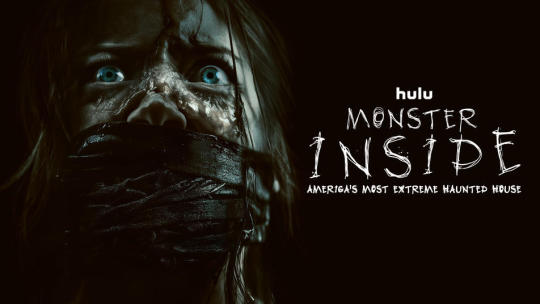
The title makes it sound like a run of the mill unscripted TV special, but MONSTER INSIDE is an examination of Russ McKamey's questionably legal, escalatingly sadistic haunt--which, as many have pointed out, isn't really a haunted house attraction, but something called an "immersive horror experience". McKamey used to run something more like a proper haunt, but even in its earlier days McKamey Manor was the most outrageous available version of the haunt experience; in HAUNTERS we see patrons begging for their freedom, some of whom are visibly bleeding, a few of whom are forced to eat their own vomit, and one of whom experiences a psychotic break and grabs an axe from one of her tormentors to try to escape. Since that time, it seems that things have only gotten worse, with literal waterboarding as part of its standard operation. MONSTER INSIDE features a set of interviewees who have been through one of McKamey's "tours", and who feel the need to speak out about what they were put through. Each of them experienced a sort of grooming process during which McKamey made them feel as if they had been specially selected from among the tens of thousands of prospective victims on a waiting list; he buddies up to them, pumps them full of ego-inflating talk about how they could be the one to put on "the best show ever" for his ever-present video camera, and gets them to sign a waiver agreeing not to press charges if they incur a whole encyclopedia of mental and physical injuries, including many things that an individual doesn't really have the legal ability to consent to. They are then tortured--there is really no other way to put it--for up to 12 hours on McKamey's property. They are not released until he is satisfied with a humiliated admission of total defeat; even in its earlier incarnations, McKamey Manor has prided itself on having no safe word. And, with some customers so traumatized that they can't remember things like where they are or who was the first United States president, retaining a safe word seems to be out of the question anyway.

One might ask, why would anyone subject themselves to this? MONSTER INSIDE does its best to address this mystery. The question of why anyone likes to be scared is always at the heart of the horror conversation, and common answers range from the catharsis screen scares can provide, to more intellectual motivations for exploring darkness. This line of inquiry may extend to why we enjoy Ouija boards despite (or perhaps because of) the popular warnings about how easily they can be misused, and why we agree to crowd into a darkened bathroom and chant the name of an evil spirit who will supposedly spring out of the mirror with murderous intent. Early in the found footage movie WE'RE ALL GOING TO THE WORLD'S FAIR, the naive young protagonist explains her participation in a cursed internet game reputed to have all sorts of terrifying effects, saying, "I love horror movies, and I thought it might be cool to try actually living in one." This may not be a truly satisfying reason for sacrificing one's connection to reality, but it is an honest one; Those of us who chase scares do it for personal, emotional reasons that may not translate into entirely rational statements. Still, the survivors of McKamey Manor make an effort: One horror fan is trying to launch her acting career, and knows that Russ's streamed footage of her ordeal could make her famous. One is a war veteran whose PTSD pushes him toward extreme sadomasochistic experiences. Many express a desire to prove something to themselves by facing their worst fears, of which McKamey collects a detailed list. And while scrutiny always seems to land on the victim who "must be crazy", one shouldn't forget the $20,000 reward offered to anyone who survives one of these indefinite "tours". No one was ever won this prize, though not for lack of trying; MONSTER INSIDE shows footage from the end of a session with an unyielding customer who McKamey belittles and berates despite his obvious win.

MONSTER INSIDE: AMERICA'S MOST EXTREME HAUNTED HOUSE is a fascinating, and continuously frustrating experience. It's a worthy project just to expose the true effects of McKamey's possibly illegal business, although it is also clear that exposure is what he wants more than anything. Early in the documentary he happily declares, "I probably wouldn't do the haunt if I wasn't able to film it, because I want the world to see what I'm doing." He does not appear to be making a fortune from this business, despite his legions of cultish fans who are happy to stalk and harass people who speak out about his abusive practices; at one time (and perhaps still?) a few cans of dog food were the cost of admission. Watching McKamey's antics are a good reminder that much of what we commonly think of as psychopathic behavior is really rooted in a desperate, insecure need for attention. Especially-men who identify with fantasies of merciless machismo, who insist on having everything their way and who do not take No for an answer, are really revealing a kind of extreme fragility. Despite their fantasies about being the alpha wolf, in their intolerance for anything that isn't exactly to their liking, they demonstrate a morbid lack of hardiness. If you can't take rejection, you're weak. If you can't handle even meaningless insults or negligence from people you don't even respect, you're weak. If you cannot ever be alone, if you need attention so badly that you're willing to hurt and disgust people to get it, after failing to genuinely impress or endear yourself to anyone, you're weak. You're infantile. Darwinism would weed you right the fuck out. You are not an apex predator, you are not the epitome of masculinity, if you are nothing without attention. I've known men like this, unfortunately, and when I see a guy like Russ McKamey in the midst of this power-mad hysteria, I see a wilting orchid who wouldn't last a second outside of his self-created greenhouse, and I wish I could tell him that.
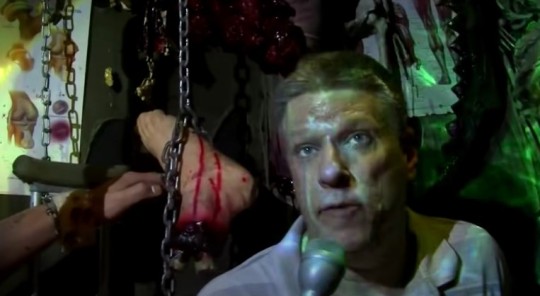
But maybe no one has to. Maybe he already knows. In HAUNTERS, his wife laughs affectionately about McKamey's extraordinary wussiness; she tries to list his various fears, and doesn't seem to know where to start, but the documentary helps us out with footage of someone chasing him up and down the block with a snail. Russ is begging for mercy and appears to be in genuine distress, which is enormously satisfying, all things considered. I wonder if he would take $20,000 to let the reasonably angry survivors of McKamey Manor indulge in a little mollusk-flavored revenge.
#horror#found footage#supernatural#documentary#haunt#haunted house#immersive horror#russ mckamey#mckamey manor#hell house llc#spookers#haunters: the art of the scare#monster inside: america's most extreme haunted house#blogtober 2023
10 notes
·
View notes
Text
thinking about NPD acceptance/positivity tonight. i still feel uneasy with identifying too hard with personality disorders but here's a thought:
a road block to healing mental & emotional wounding is often inability to accept due to toxic shame, that goes to the core of a person. like a huge part of NPD and other personality disorders is believing "I am X" and "X is evil/wrong/inhuman" and the logical conclusion "I am inherently evil/wrong/inhuman." therefore overinvesting in crafting an image of the self that becomes bloated and obscures actual self awareness. maintaining this image is exhausting and often impossible. especially when it is linked to moral obsessions. nothing is more disconnecting with other human beings than having intense internal pressure to maintain a delusional image of the self as good/perfect.
some folks end up "solving" this issue by inverting it and being fully honest about their shame-based image instead. it's a kind of relief, but it doesn't actually allow you to connect with people. it's Bojack Horseman. he leads with how much of a POS he is, and guess what? self fulfilling prophecy.
he's a bit more tolerable than Mr. Peanutbutter in that show but still - both characters miss out on the full truth of their humanity. Or dog-manity? horsemanity?
The shadow side and the basic fundamentals goodness of being a Being on this Earth, in everyone. In fact life is simply complicated and good/bad a somewhat arbitrary, community defined distinction.
So what does that have to do with NPD?
Well, honesty is a good first policy. But the intense self focus of the disorder, is disabling, and can lead to hurtful actions due to lack of awareness or understanding. I don't see personality disorders as value neutral due to the fact they are disturbances in the balance of human relationship. It's not the pwNPD's fault, but the way they've learned to exist causes issues. It just does. I don't think it's positive although many narcissistic people have positive traits still. They simply tend to be incapable or struggle to do the simple relational repair work of apology, sincerity and investment in others well-being. These are skills that can be learned, as the core wound of toxic shame is also addressed. It is possible to crawl out of the prison of your own mind into the sunlight.
But it is really, really hard work. And that's where personality disorder acceptance or at least just "lots of people are fucked up and it's possible for them to still learn and grow" as a movement is important.
I believe personality disorders need the same destigmatization as, for example, meth and crack. Not because yay they're great! or because everyone will and Should recover or else be deemed Inhuman and Irrdeemable, but because everyone deserves to be seen in their full humanity, and have access to what it takes to recover, even if in the end they can't beat the habit.
Because narcissism is a deep, wormy habit. For most of us, a survival habit gone awry. And for some of us, autistic people especially, we might never be able to survive without focusing a lot on ourselves and getting called narcissistic for it.
A friend talked with me about my inability to show up for them recently. I kept coming back to my intent and they told me this was hurtful too because regardless I still impacted them. And the old habit of anger and denial and splitting came up to the surface. But under it I felt a inkling of empathy, like really being able to sit and imagine what their pain felt like. That inkling gets shoved down because it brings up pain with it - pain of toxic shame and guilt, of frustration that I feel at my absolute limit and can't live up to expectations, anger with myself, fear of those selfish parts of me that don't actually give a fuck.
It challenged me to be honest.
Addicts say you know you're in trouble when you realize you have stopped caring.
So with these personality coping traits, it is similar. I'm losing my battle when I stop caring about others. And I can't care about others without caring for myself enough to at least not be in empathy burnout.
I would really like to be a person who carries extensive knowledge of machinery or plants or languages or myths or even just my friends and community. To give myself over to that and feel how good it is to let go of self image and be in passionate mutual relationship with life. Instead of cramped anxious and stuck within myself like a tangled labyrinth. Or my only area of expertise being psychology I have learned to save myself.
However at this point in life habits are setting in. I know the old cracks and quirks of my traumagenic beliefs like "reaching out to people is a nuisance" or "if I do not pretend to be perfect some terrible thing will happen" or "being liked is more important than anything" they're very well worn. but I am not sure they can be beat until I am secure enough to let go a bit, and get into some deep therapy or creative work.
it's very annoying to be run on old programming and feel unable to do anything concrete about it yet.
So yes, personality disorder neutrality is helpful. Recovery is a life long process. It upset me a lot when I first read that in a forum somewhere. I wanted so badly to be fixed and have this horrible fear and shame in my soul removed. But it's a long dirty process that you have to learn to enjoy or at least feel deeply. just like addiction recovery. Stigma only cements people in their shame and keeps them isolated.
Those are my thoughts for now. And Yes, I've been reading Gabor Mate's In the Realm of Hungry Ghosts .
#also mych to be said about how many autistics get misdiagnosed#with NPD or other personality disorders#personality disorder#npd#npd culture is#bpd#psychology#gabor mate#addiction
7 notes
·
View notes
Text
Anyone Else Having Trouble Finding New Youtube Channels?
Title of this post kind of hits at the core of what I'm trying to figure out here. As the years have gone on, while my tastes and interests have expanded outward, whenever I go onto youtube, I find it tough to find anything new to watch.
When I say ‘new,’ I mean things that aren't already popping up in my subscription box, and I generally try hard to avoid the ‘recommended’ videos that Youtube gives me when I watch something else as a lot of them only feel like they're superficially related to what I'm interested in. And then there's the issue of actually trying to search for something to watch after exhausting my subscriptions.
Much like how I'd use google during the early internet days, I loved searching for really broad topics and just… browsing youtube to see what I could find. There was a weird sort of simple pleasure and joy in just exploring the very broadest of topics on a site like youtube.
Maybe I'm just having an ‘old man in my 30’s' moment, but it really does feel like places like Youtube don't want you to search anymore. They just want you to click on video after video without really thinking about what it's about or who made it, only that it's kind of, sort of, potentially still related to the topic I was listening to before, but this is one of the reasons I keep autoplay off for anything except for playlists; I don't go to youtube to play the Wikipedia game.
Obviously, there are outliers here. I've found some very nice channels through Youtube recommendations, but those have been exceptions to the rule so far. More often than not, I feel like I'm being pointed towards content mills more than anything else, and the absolute deluge of channels, especially shorts, that utilize an AI to read out a script, and just summarize the plot or surface-level themes of a movie or a game.
Thankfully, a lot of the people I follow seem very willing and able to recommending their own mutuals or folks that they follow that are related to their own content, and it feels like I've gone full circle back to when word of mouth was one of the primary means of finding something to your interest.
Does anyone else feel this way? Does it feel like you find new people to follow more from recommendations from people you already follow, or do you find these algorithmic rabbit holes helpful to your own interest? i'm very interested to hear how you all find new stuff to watch or to read?
#Youtube#Youtube Channel Recommendations#How do you guys find new stuff to watch?#Genuinely curious here
3 notes
·
View notes
Text
Elaborating more on thoughts relating to this post on a separate post so I don't take away from OP's points. There's a chance that none of this will make sense, or perhaps I'll come off as hurtful, and if either case happens please please please DM me or reply to this. Genuinely, I want to be a good person, don't be scared to approach. I'm just 18, I'm not gonna chew you out for anything
All of it is going under the cut because really, I'm just rambling and putting random thoughts together. Some swears, negativity, all that kinda junk, and I know it'll be long(also rbs are turned off because I do not want to deal with drama, college starts in a week)
I've never gotten any hate from the community for anything, I'll be upfront on that. I've only gotten 1 hateful ask in my entire time having this blog and the previous one I accidentally deleted. Irl is a slightly different story, but that isn't important to this. The worst I could even tell you specifically relating to the selfship community is not getting a lot of engagement on my posts, not getting asks when I rb ask games, and sometimes the occasional blocked out of nowhere by someone I believed I was friendly with.
I hope I've been nice in this community as well, I've been doing my best to be welcoming, open, and kind to anyone I come across. I also try my best to not complain about certain things(like lack of engagement), or even venting about irl stuff. Sure this is my blog, I can post whatever the hell I want, and to some extent I do, but I also try to have this place be one of comfort and recluse from the world. That what selfshipping was for me when I was younger, and it still kind of is, so I want others to to have that as well.
Admittedly, it's why I don't talk about real life issues often if at all. People can criticize me for that, but honestly I don't think it's fully necessary for me specifically to do so. I don't have enough followers to where me speaking about things would do much. Everyone who follows me would know about them already, and I would just be stating something that should be obvious to anyone who knows me even surface level(like killing trans/queer folk for being themselves is horrible, women should have control over their own bodies, black/poc people are equal to white people, etc etc). Genuinely, logically, I don't see any instance where I actually need to bring it up.
Also also, while yes, I'm lucky that I haven't gotten any hate, I do know people who were chased off of their own platforms because of the characters they liked, or even because they didn't know EVERYTHING about something. Their own f/o's creators or source material, an acquaintance/friend's f/os, or whatever else there is. I know of a person who was forced out with fire and pitchforks because they specifically liked a different version of a character, one where they weren't bad or anything. But because of the similar name garbage, people believed they liked an undead man who happily and openly murdered people and chased them out.
And honestly? The community has such double standards and is sometimes super online. I know I know, I'm a terminally online person too, I'm a hypocrite, but I still try to bind myself to reality and realize when some issues are, in all honesty, fucking stupid. You know how many people I've seen selfship with murderers? Not just "oh they're so misunderstood 🥺" characters either, I've seen Chucky(both human and doll), I've seen Jason, a bunch of different characters who openly enjoy murdering, who manipulate and torture, and almost none of them are openly hated or chased out with the same hatred and anger I've seen others get treated with. It's because it's not wrong. If it's not a real murderer and the person doesn't want/fantasize about doing that irl(basically bad mental issues), who cares? Genuinely, what's the issue? None, because most people don't have a problem at all with it unless it's a specific character they don't like much apparently.
As well as this, people are expected to know so much in this community. The dos and don'ts, who's right and who's wrong, what traits make a character wrong to selfship with, and the smallest mistake or unknown information can get their head on a stick. Ik a kind of big situation happen a few years back that's similar to what I'm talking about, but it's not the only thing I've citing. This has happened before, it's not a one time occurrence. Oh, you didn't know that this person you follow has an f/o who's some kind of abhorrent person? Well, to the shredder with you then. Oh, this person has an f/o who was once a bad person but has since grown and is doing good now in their source material? Well, you and the majority only know them as a villain, so go scream at them for liking such horrible things.
I'm not saying everyone is like this ofc, I'm not thinking that "oh the whole selfship community is bad I'm the only good one here. :(((" It's just that either a majority or perhaps a very loud and active part of the community are, and it sucks. The double standers suck, the demands lots have are so much, sometimes it could feel like more of a hassle than anything.
And I'll admit, I think most of it comes from the fact of what selfshipping IS. It's a form of selflove and everything, but it can go to far. "Too much of a good thing isn't a good thing for anyone." Too much confidence can make you an asshat, too much kindness can make you a doormat, too much of a specific profession or environment can make you jaded, and too much selflove can make you selfish and narcissistic. It's a safe space away from things, yes, but when you demand others do what YOU want because it'll make you more comfortable, it's just a whole mess. You need to block the tags, you need to block the people you don't like(you don't even need a good reason, blocking is free), it's up to you to curate your online experience. Like someone's art but hate a specific ship? Block the tag and keywords. This one Selfshipper annoys you and nothing else? Block them. Stop vagueposting and being so negative. You can say you're sad because you saw someone else shipping with your main, but don't name drop or be so specific that someone could figure out who.
I'll admit, the last bit comes from my own annoyances and experience. I stopped talking or joining any selfship servers because I had negative experiences. One situation specifically had someone upset that I shared an f/o with them that they were uncomfy sharing. I told them I don't talk about them often, and anytime I do I'll spoil it and have a warning. But it wasn't good enough for them apparently because they'd "click it and see/read it anyway." When they then went on to vent about it for more than a full day in the server's vent chat, it really felt like they wanted me out so they could be comfortable, all because they couldn't control themselves.
I'm sorry to be so mean, but sometimes you gotta man up. It's okay to not want to share, your f/os truly loves you, but it doesn't mean you're allowed to make demands out of others. You can ask for a tag to block, or a warning so you don't have to see, but that's all you can do.
I think that's it, sorry for all the emotion. As I kept writing I kept wanting to say more. I hope it makes some sort of sense lol
3 notes
·
View notes